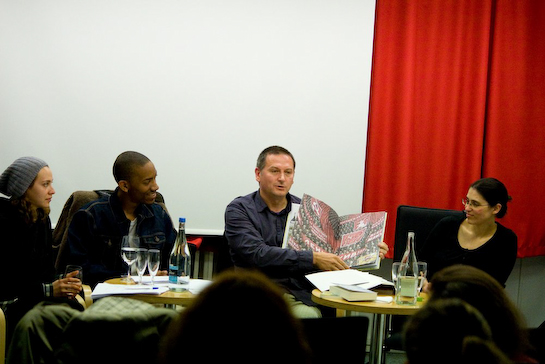
On the 6th of June, the ECLA community welcomed Bulgarian writer Georgi Gospodinov. The evening entitled Survival Kits for Apocalypses included readings from Gospodinov’s play The Apocalypse Comes at 6 pm (in which two ECLA students were also involved in the reading), from his poetry, and from the latest novel The Physics of Sorrow.
Georgi Gospodinov also presented some of his other projects, such as the Inventory Book of Socialism, and a short but lively discussion followed.
Faculty member Ewa Atanassow introduced our guest by mentioning that he is, “the star if not the superstar of new Bulgarian literature”. She also stressed the fact that Gospodinov has a distinctive and, to her view, very successful way of engaging with the past and its political phantoms, namely, there is a powerful lyricism inherent to Gospodinov’s work.
In fact, the confirmation was not to be long awaited, as the reading from the English version of the play The Apocalypse Comes at 6 pm, which was first presented at the theater festival hotINK at the LARK, New York in 2011, started. The voices of ECLA students Maria Androushko and Michael David Harris, alternately reading fragments together with the author, only enhanced the polyphony and carefully constructed fragmentation of the text, in which ultimately, to cite the work itself, “everything is connected to everything else.”
The public lively responded to Godspodinov’s poetry, read both in Bulgarian and in English. Even from the few poems read one could gather the image of the author’s versatility.
From erotic poetry (The Love Rabbit) we passed to a series alluding to the Beatles’ songs and then to the playful and subtly intertextual Technique of Filleting Texts: “AM I DELICIOUS, DARLING?”/Words are small fish/with lots of tiny bones-consonants/ Let me take them out for you/ before I melt up in your mouth/“A I E I I O U, A I?”. Changing registers again, Gospodinov showed us various pages and illustrations from the Inventory Book of Socialism, which reproduces through photography objects from the Communist past of Bulgarian society.
When asked about how exactly writers can or should reflect the past of their culture and society (with reference precisely to the situation of ex-Communist countries), Gospodinov spoke about the paradox of how society positioned itself towards the events. It was often a, “schizophrenic mentality,” people being both dissidents and supporters, torn between public and private. His own goal, he asserted, is to understand things which are still obscure, such as the true reasons for people’s collaboration with the state security.
The writer’s task, as Gospodinov sees it, is to mistrust whatever the experts say. In this sense, he sees a mission in telling the untold stories of people, even of those who for some reason don’t feel the urge to tell them (in this context it is worth mentioning that in 2006 Gospodinov edited I’ve Lived Socialism. 171 personal stories).
In perhaps one of the most interesting moments, the writer spoke about the recurrent symbols and idiosyncrasies in his works, such as flies. “Flies are important because small things are important”, he said, modestly. Questions from the Bulgarian audience followed and the discussion was this time about concrete instances of the image of Bulgaria and its people in recent literature (either Bulgarian or international).
Along with comments on the different variants of the Bulgarians’ portrait in the eyes of the world, Gospodinov spoke about the need to have amessage, a face and not be “the quiet Republic” anymore. Exporting distorted stereotypes or exotic subjects, he suggested, is not always a good idea; rather, what needs to be promoted is a normal image.
In the final part of our meeting, Georgi Gospodinov referred to ECLA’s inquiry into values and, after the reading of a fragment from his recent novel The Physics of Sorrow, he suggested two values (which are non-obvious, he anticipated): 1) staying “on the losing side”, i.e. literature should regain the space of sorrow, hesitation, uncertainty and be able to console people with dilemmas and hesitations instead of people blindly following the slogan “be yourself”; 2) the sublime can be found everywhere (referring to the fragment from the novel and to his other works: even in the shape of dejections or toilets): “The sublime will reveal itself to you in your own language.”
by Aurelia Cojocaru (2nd year BA, Moldova)
